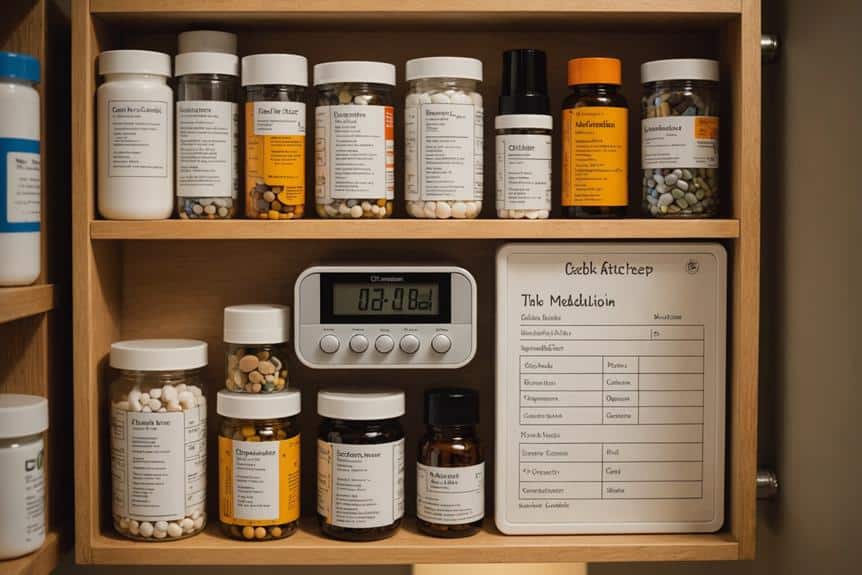To manage medications safely at home, start by organizing your pills with a pill organizer or dosette box. Store medications in a cool, dry place, out of children's reach, and make sure to check expiration dates regularly. Always follow the instructions for taking your medications, such as whether to take them with food. Keep a Medicines Administration Record (MAR) to track doses and address missed medications. For unused meds, participate in take-back programs or dispose of them properly. Using tools like reminder apps can help you stay on track, ensuring your health remains a priority as you learn more about best practices.
Importance of Medication Management
One effective way to improve your adherence is through patient education. Understanding why you take each medication and how it benefits your health can motivate you to stay on track. Utilizing tools like dosette boxes and blister packs can further enhance your medication management by providing visual reminders and reducing the risk of missed doses, as noted in medication compliance aids. Structured medication reviews offered by your GP can also help assess the appropriateness of your current medications and address any concerns you may have.
Incorporating adherence strategies into your daily routine can make a significant difference. Tools like pill organizers, smartphone apps, and alarm reminders can help you remember to take your medications as prescribed. For vulnerable patients, such as the elderly or those with cognitive impairments, compliance aids—like large print labels and Medication Administration Record (MAR) charts—can enhance medication management.
Safe Storage Practices
- Store medications in a cool, dry place. Avoid bathroom cabinets, as moisture can degrade your medicines. Proper MAR maintenance includes understanding the importance of storing drugs correctly to prevent degradation and guarantee safety.
- Keep medications in their original containers. This helps with labeling medications clearly, reducing the chances of confusion with similar-looking substances.
- Confirm all medicines are out of reach of children. Use child-resistant caps and consider locked cabinets if necessary to keep little ones safe.
- Regularly check expiration dates. Properly dispose of any expired medications by returning them to a pharmacy or using take-back programs.
Additionally, follow any specific storage instructions that come with your medications. For instance, some drugs may require refrigeration. By adhering to these guidelines, you can maintain the effectiveness of your medications and reduce the risk of accidental ingestion by children.
Taking these steps not only protects your health but also provides peace of mind. You can feel confident knowing you're doing everything possible to manage your medications safely at home. Remember, safe storage practices are an essential part of medication management, helping to prevent potential hazards while guaranteeing you have access to effective treatments when you need them.
Proper Administration Techniques
Always check if your medications should be taken with food or on an empty stomach, as this can greatly affect how well they're absorbed. Using accurate Medicines Administration Records (MARs) can help you track when doses are given. This guarantees that any missed doses are addressed according to prior agreements and risk assessments.
It's also essential to adhere to the "6 Rights of Medicines Administration": the right person, the right medicine, the right dose, the right route, the right time, and the right documentation. These steps are important for safety and compliance.
Here's a quick reference table to help you remember these important aspects:
| Aspect | Details |
|---|---|
| Medication Timing | Administer at specified times |
| With Food or Not | Check instructions for absorption |
| MARs | Use to track doses and missed medications |
| Monitor Reactions | Observe for side effects post-administration |
| 6 Rights | Guarantee safety in all steps |
Effective Disposal Methods
- Participate in medicine take-back programs: Many local pharmacies and community programs offer events or options for safely returning medications. This initiative aligns with the principles of accountability and compliance in social care, ensuring that medications are disposed of properly and responsibly.
- Mix with unpalatable substances: If you can't take them back, mix unused medicines with coffee grounds or kitty litter. This makes them less appealing, then seal them in a plastic bag before throwing them away.
- Remove personal information: Always take off your name and other identifying information from prescription bottles to protect yourself from identity theft.
- Follow FDA guidelines: Some medications should be flushed down the toilet to avoid environmental contamination. Check the FDA's recommendations to know which ones.
For sharps, like needles and syringes, don't just toss them in the trash. Place them immediately in a designated disposal container and check local regulations for safe disposal options.
Tools and Resources for Support
In addition to pill organizers, consider utilizing mobile apps like the Scottish Government's Managing Multiple Medicines. These apps provide valuable medication reminders and help you track your intake and renewals. For those who may have trouble remembering their schedules, automated dispensers and smartphone alarms can be excellent reminders, making it easier to stay on track. Moreover, seeking assistance from a family-run local care company can guarantee that you receive personalized support for medication management. Don't hesitate to reach out to your pharmacist for guidance. They can recommend specific medication management tools, such as blister packs and dosette boxes, which are especially useful for those with complex medication schedules. In addition, free Medication Administration Record (MAR) charts are available, allowing you or your caregiver to monitor doses taken consistently.





